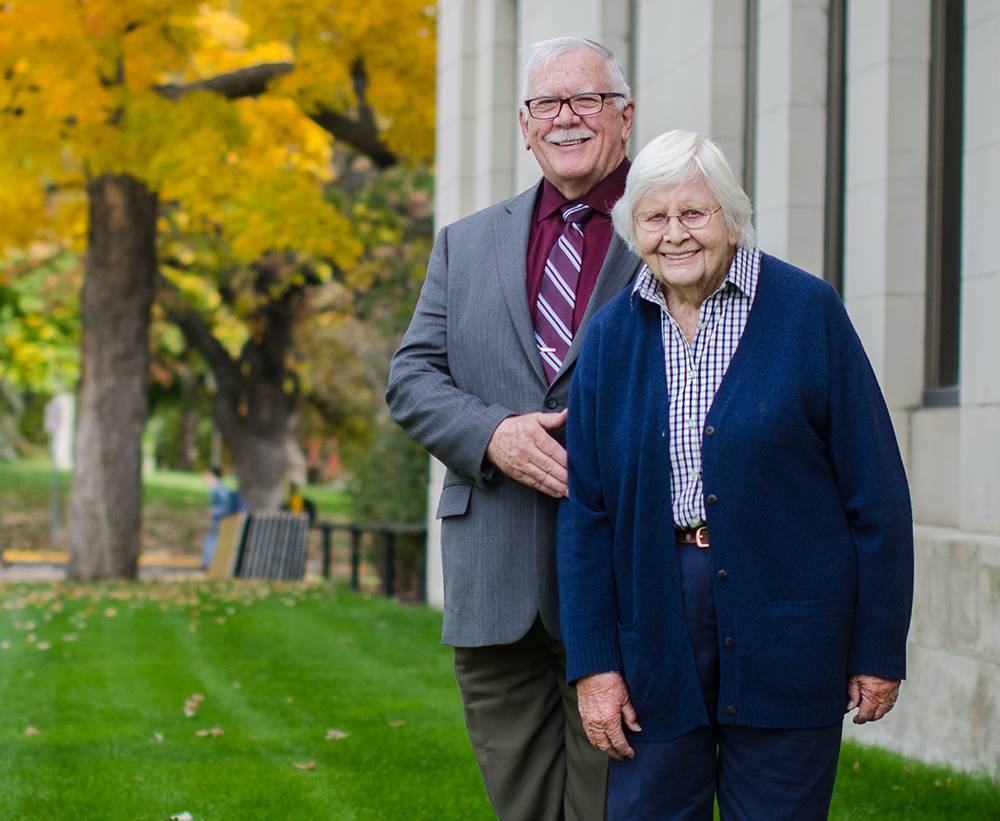Beth Anderson, ’55, and her son, Steve Suba-Anderson, ’70, have lived remarkable lives, and they credit the University of Minnesota.
“For both of us, the University has provided not only the degrees but also a tremendous education,” says Suba-Anderson. “It provided a career for my mom that afforded her a way to be a single mother who lived well and had a good life.”
Mother and son appreciate the scholarships that allowed them to earn higher degrees, too. Now they want to help the University of Minnesota raise more funds to aid today’s students and research.
Bucking tradition
Armed with a 4-H scholarship that would pay her first year’s tuition, Beth Anderson set out in 1940 to become a home economist. That meant bucking her family tradition of attending a Lutheran college.
“When I said I was going to the University of Minnesota, they said, ‘Oh my goodness! . . . Why?’” she remembers. “Because I wanted to go into home economics, that’s why!”
Then World War II intervened. After only two years at the University, Anderson enlisted in the Marine Corps. Her education paid off immediately because it allowed her to choose how she wanted to serve. She picked assignments as a cook and baker at Camp Lejeune and Cherry Point in North Carolina, where she served 2,000 marines a day. Also in North Carolina, she met her husband, who died not long after the war.
In 1945, Anderson became the first woman to attend the University of Minnesota on the GI Bill, which covered her tuition. She earned $100 when she won a bread-baking contest to cover books and living expenses for her first quarter. She and young Stephen lived in an 18-foot trailer in family housing near wartime Quonset huts erected on campus. Faculty sisters Harriet and Vetta Goldstein, who would later found the U’s Goldstein Museum of Design, often babysat so Anderson could run errands and do her shopping. They were so impressed by her decorating on a small budget in such a small space that she gave them permission to show her trailer as part of their classes.
Anderson finished her undergraduate degree and then her master’s degree in home economics in 1955. She took a teaching position in Chatfield, Minnesota, where she taught for eight years before moving to Cloquet. There she continued to teach high school home economics as well as continuing education classes at night. She was named Minnesota’s Outstanding Community Educator in 1986.
At age 50, Anderson tried backpacking. Over the next 25 years, she led about 20 groups from Cloquet on backpacking trips in the western United States. After retiring from teaching, she helped to develop an advocacy program for victims of domestic abuse and served on the Minnesota Coalition for Battered Women. When she moved to New Mexico, she served on that state’s Citizens Review Board for Abused Children.
New frontiers
Suba-Anderson’s connection with the University began in January 1964 after he graduated from high school in Cloquet and served six months of active duty in the Minnesota National Guard. At first he planned to go to law school, but when he got an A in Introduction to Sociology he said, “That’s my major!” He completed his B.A. in 1967.
While working at the YMCA in north Minneapolis, the director encouraged him to consider a master’s degree in social work. President Lyndon Johnson had declared the War on Poverty, and the push to increase the number of social workers resulted in more scholarships. Suba-Anderson started the M.S.W. program at the University of Minnesota in 1968 and remembers that, in the entering class of 60 students, 58 were on scholarships. His own scholarship, from the Children’s Bureau, covered his tuition, books, and fees, plus $3,000 for other expenses.
“I lived high on the hog,” he says with a grin. In 1970, he completed his master’s in social work.
Suba-Anderson earned his doctorate in social work at the University of Texas at Austin in 1980. For the next 21 years—except for two years as an associate professor at the University of Botswana—he served on the University of Oklahoma faculty. In 1982, he became a founding member of Transition Housing, a nonprofit organization that helps individuals with mental illness transition to independent living, still thriving today.
From 2001 to 2008, Suba-Anderson directed the social work program at New Mexico State University. After rejoining the faculty and until his retirement in 2011, he developed several courses for online delivery and focused on excellence in online teaching. Today he lives in Henderson, Nevada, and still teaches online social policy courses for New Mexico State.
A father of three, Suba-Anderson came out as a gay man in 1992. Last year, after 29 years with his husband, Rex Suba, he says, “We decided it was time to get married because we could. I never thought this day would come in my lifetime.”
Paying it forward
Beth Anderson and Steve Suba-Anderson are both acutely aware that today’s students don’t have the good fortune they did. Helping the University raise funds for student scholarships and research is a goal they share.
On a visit to campus last fall, Anderson created an endowment to support early childhood education, while Suba-Anderson pitched a fund-raising idea for the School of Social Work. He was delighted to learn the school will launch the Power of All campaign to raise funds for student scholarships in anticipation of its one-hundredth anniversary in 2017.
“I thought, I can die now!” he says. “My life’s complete.”
Read more about the Department of Family Social Science and the School of Social Work.
Story by Jackie Colby | February 2015
